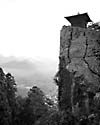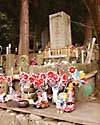29/10 Oishida
After one night we travel on to see the Mogami River at Oishida, it seems deep in the heart
of the country and the river itself is silent and grand, although in the tradition of classical
poetry it is described as a rushing torrent. We stop only for 45 minutes, and a light rain spits
down from heavy cloud.

Capturing full
The rains of May
Swift Mogamigawa
Basho _ The Narrow Road to the North
五月雨をあつめて早し最上川
(松尾芭蕉 − おくの細道)
Yamadera

The complete silence
Of the temple _
Only the voice of a cicada
Pierces the rock
Basho _ The Narrow Road to the North
閑さや岩にしみ入る蝉の声
(松尾芭蕉 − おくの細道)
We travel on to Yamadera the same day_ from Basho's description of it as a place of silence
and stillness I am looking forward to seeing how much the place has retained this quality
after 300 years. Also I have been told that we may meet someone there; Toshihiro san, who
is also travelling around Japan, researching a book on place and poetry. The
coincidence that we will be in the same place at the same time looking at the same things
is very exciting, but also I am conscious of the fact that this means little in terms of whether
we will be of like mind. The majority of people who have seen the exhibition at Asuka have
been politely perplexed as to why I should include diggers or corpses of dead cats in
pictures of sites revered in ancient poetry as places of great beauty.

We arrive at Yamadera at night and the shadow of the mountain rises darkly above us. It is
not completely silent _ there is the quiet sound of the river in the moonlight, and, strangely,
no houses in the village show signs of life. Only the pension where we are staying has light
in the windows. However there is no one called Toshihiro booked in. I am relieved and
disappointed at the same time
The next day it all changes with hundreds of visitors arriving. The temple and view from the
mountain is overwhelmed by the chattering and to-ing and fro-ing. The final straw comes
when a woman selling konyaku at the site of the semi zumi _ the spot where Basho
composed his haiku praising Yamadera stillness - chastises me for smoking on a sacred
mountain.

In the evening we arrive at Sendai. Something of a relief to be in a big city, and in the
midst of drunk salarymen and hostess girls on the way to work we find a hotel in the pleasure
district.
30/10 Sakaida

Fleas and lice
Asleep in bed
A horse pissing
Close to my pillow
蚤虱馬の尿する枕元
(松尾芭蕉 − おくの細道)
The day is very grey, and a succession of slow local trains lead to a station in the boondocks.
We are the only people to get off at Sakaida, where the house in which Basho composed
the above poem has been turned into a museum. We have only a few minutes to get a
picture of the house before the next train arrives in the opposite direction to take us back to
Sendai; if we miss it there's a long wait in the middle of nowhere with nothing to do but get
drizzled on by a light rain. Before leaving the platform I contemplate taking a picture of
the toilet at the saddest station in the world; there is no ticket office or even a vending
machine; just an empty waiting room with the small concrete block of the toilets next to it. I
open the door and see that it is full of cobwebs and bugs. Perfect; but in the rush to get to
the museum and back to the train I have to forgo capturing this image.
31/10 Sendai

Send for an umbrella,
For the dew under the trees
In Miyagino
Is greater than rain
Kokinshu #1091. Anon
みさぶらひみかさと申せ宮城野の木の下露は雨にまされり
古今和歌集 #1091
Early in the morning we visit Miyagino which in Basho's time was well known as a field of
bush clover and for the dense pine woods of Konoshita. The Miyagino we see today is a
sports stadium and baseball field, and further out, a container yard. Then, after a long
midday siesta, we then rush out to Natorigawa at sunset, where I hope there was enough
light, as the image I found there was one of my favourite so far _ a suspicious looking 70's
car parked under a graffiti covered bridge.

The Shadow of red autumn leaves
On the banks of Natorigawa
Makes a carpet of rich cloth
On the river bed
Sankashu. Saigyo
なとり川きしの紅葉のうつる影は同じ錦を底にさへ敷く
(西行法師 − 山家集)
1/11
On the road again after our relatively luxurious stay in Sendai; I had some developing done
and to my great relief the negatives look usable. I cannot enjoy the views I see worrying
about whether I will adequately visualise what I want on film, at the same time I cannot
enjoy a scene unless, in some form, I try to create something from the experience of it.
It is a short trip to Shiogama, but we are definitely in the country again. The hotel where we
stay is reminiscent of Vietnam, in the 50's leatherette feel to everything. A hard day out - a
lot of walking in strong winds, but, on the bad side of the tracks, so to speak, we come across
a junkyard that is full of colour and where half empty cans of paint, plastic armchairs and
dead fish share the same resting place. Delightful. In the evening Tamiko wants to have
sushi as we are staying in one of the biggest ports in Japan. It tastes good, but I must admit
that even after all this time of eating Japanese food, I can't help feeling uneasy in case
anything I eat moves.
In Michinoku province
Everywhere is sorrow _
But especially here in the bay of Shiogama
When I see the boats pull away
Kokinshu #1088. Anon.
みちのくはいづくはあれど塩釜の浦漕ぐ舟の綱手悲しも
(古今和歌集 − #1088)

2/11
After a week in the North we come to Matsushima _ One of the main reasons Basho sold his
home and belongings to travel. The crowd on the boat is a portent of things to come; noisy
and drunk, Tamiko takes the lighter view of this and is happy that the crowd are enjoying
themselves.

With so many poems already written about the beauty of Matsushima, Basho did not
attempt to write anything here, and in a similar fashion I am inclined not to compete with
the wealth of gorgeous images that so many photographers have made of the islands here.
However, when we go up to the viewpoint of Saigyo Modoshi koen, where the poet Saigyo
failed to answer a koan and had to return from Matsushima without seeing the islands, I
cannot resist taking a picture of a 'panorama' caf_. It is loudly playing 70's music to the only
other visitors there _ a young couple who resentfully move on when we disturb them from
snogging.
We are booked into a little ryokan near the sea front, and the woman who checks us in is
extraordinarily helpful and kind. She brings us our meal with a deep sincere bow that is
almost shocking, I want to eat everything on the tray to show how much I appreciate her
welcome.
Early next morning, feeling guilty about my failure to even try and capture some of the
beauty of the place, we go to the little island where Basho first alighted in Matsushima and
catch the dawn.

|
|
1998年10月26日
ようやく関西を出発。新大阪から新幹線で東京へ、そしてそのまま高速バスにて秋田県象潟へ。
夜9時半出発の‘ドリーム鳥海号‘で旅が始まる。夜の東京を高速で抜ける。オレンジ色に光る
道路の川。その上を滑っていく赤いヘッドランプの波。巨大な団地の森をバスから眺める。瞬時
に走り抜ける細長い動物は、電線を空へとつなぐ電柱だ。
不思議と、これからの旅を思いはしない。いまこの旅を思っている。疾走するバスの中の旅を。
今始まったばかりの旅だ。漂泊の思いがやまなかったわけでもなく、出てきてしまった旅。縦横
に流れる高速道路の輝きを眺めながら眠る。
目覚めると、そこに北斗七星があった。すぐ、斜め上のそこだ。窓ガラスの存在さえ無視して、
すぐそこにある。そうか、星か、あったなそういえばそんなの、と一瞬思う。それとも、まだ高
速道路の灯かりか、とも思うもやはり星だ。ちゃんとひしゃく型に七つ並んでいる。暗闇の向こ
うを透かしてみるともうとっくに東京を抜け出して東北道にはいっているらしい。家も灯かりも
まばらだ。星だけがある。闇の支配する夜は、ひっそりと静まり返っている。バスのエンジンだ
けが元気に唸っている。ちょっと無神経なほどに。
車内泊
1998年10月27日
朝5時50分きっちりと予定通り象潟駅に到着。星を眺めて最上川を眺めて日本海を眺めている
間についてしまった。駅前でタクシーに乗り象潟へ。九十九島と呼ばれた、もとは海だった松島
と並ぶ景勝地が1804年の地震で一夜にして海底が隆起して陸地になったらしい。今では田んぼ
の中の小島だ。地震ってすごい。首から上が雪で白い鳥海山の真横から日が昇る。朝日で雪が光
っている。久しぶりに朝日なんて見てしまいちょっと照れる。
さすらふる我が身にしあれば 象潟や あまの苔屋にあまた旅ねぬ
象潟の後歩いて日本海を見る。波が激しい。船が2隻波の間に上下している。一瞬真っ白な波に
姿が見えなくなりどきりとする。が、すぐにまた顔を出す。船は水平にも垂直にも動く乗り物だ
ったんだと認識する。初めて見る北の海は凄まれているほど美し過ぎて恐い。
汐越や鶴はぎぬれて海涼し
芭蕉がおくのほそ道で訪ねた最北の寺、かんまん寺にお参り。
象潟や雨に西施がねぶの花
象潟駅から羽後本線で酒田へ。ホテルを予約し、チェックインまで時間潰し。土門拳記念館まで
自転車で4kmのサイクリング。酒田市は観光用に無料で自転車を貸してくれる。ちゃんとまめ
に手入れされている乗りやすい自転車だった。気分のよいサイクリング。長い一日だった。
酒田泊
1998年10月28日
朝5時におきて最上川を撮影しにいこうとするも、大風と大雨。あえなく諦める。少し小降りに
なるとJohnは一人で出かけて行く。ホテルの窓から見える隣家の庭の木も最上川に架かった橋
桁もみな揺れている。
暑き日を海にいれたり最上川
12時52分の電車の時間までまたもや無料自転車で市内を走る。酒田港へ。工場とトラックと
廃車とクレーンと貨物船とが低い音立てる広いヤードの中で撮影。セメント工場のグレイに光る
メタリックな壁が眩しい。雨後のせいか潮のせいか水量の多い海が眩しい。遠くで荷役中の貨物
船の静かな威厳が眩しい。とても綺麗な風景だった。
最上川のぼればくだるいな船のいなにはあらずしばしばかりぞ
清川、白糸の滝、新庄、芭蕉の奥の細道を通過しつつ電車で進む。途中最上川を撮りに大石田で
下車。1時間の待ち合わせの間に撮影。一人しかいない駅員さんに荷物預かり所はないかと尋ね
たら、ここで預かってくれるという。橋本竜太郎似の駅員さんはとても親切だ。どうも有り難う
と荷物を置かせてもらう。
五月雨をあつめてはやし最上川
山形経由で山寺へ。今夜はここに泊まる。駅前のペンションで芋煮が夕食に出た。5時半からの
夕食後、付近を散歩。思っていたよりずっと人は沢山住んでいるようだが、あまりに静かだ。夕
方のざわめきがない。歩いている人もいない。街灯もまばらだ。突然暗がりの曲がり角から人が
出てきて驚く。不思議なしずかさだ。
山寺泊
1998年10月29日
朝はゆっくり7時頃に起きる。起きたとたん外を見てJohnは光がちょうどいいといいつつすぐ
出かける。7時半の朝食に間に合わず8時からばたばた食べて、通称山寺、立石寺にお参り。1
034段の石段をぜえぜえ登る。団体旅行のおばあちゃんおじいちゃんも登る登る。おしゃべり
に花が咲く余裕の分あちらの勝ち。ひっきりなしに上から下から人がやってくる。だけどやはり
山全体が静かさを保っているようなのは本当に不思議。力こんにゃくを買い食いしつつしゃべり
まくるおばちゃんたちでさえ、なんだか親しい。
静かさや岩にしみいる蝉の声
山寺を昼過ぎの仙山線で出発。40分ほどで仙台到着。いきなりの大都会だ。ホテルにチェック
イン。偶然にも国分町2丁目に芭蕉も泊まったらしい。今では東北一の繁華街。夜の町だ。ネオ
ンが眩しすぎる。夜名物の牛タン焼きを食べる。来るまで牛タンが名物なんて知らなかったが、
「牛タンの店」がいっぱいある。タン以外のパーツはどこに行くのだろうと不安になるほどだ。
仙台泊
1998年10月30日
このwebsiteを編集するのに手間取り、昼過ぎの出発となる。新幹線で古川まで行きそこから普
通電車に乗り換えて、途中紅葉狩りと温泉目当ての観光客がどんどん下車して行くのを見つつ、
枯れ果てた堺田駅で降りる。他に下車する人はおろか駅のホームにも人影はない。すばらしくさ
びた便所と蝿がうんうん飛び廻る待合所しかない無人駅だった。今乗ってきた電車の車掌さんが
おりてきて切符のチェックをされる。駅の周りにも何もない。間違えたかなと思うが、「―――
人の家」とかろうじて読める立て札が斜めに傾いで駅の前にある。境田封人の家だ。矢印に向か
って歩き始めると、左側に緑色にどよどよ淀んだ小さな池のようなものがあって、おじいさんが
ひとり枯れ葉を掃いている。水族館という看板が見えた。わびている。すぐに国道に出て左右を
見回すと右手に封人の家が見えた。暗すぎるので中にははいらず外から撮影。
蚤虱馬の尿する枕もと
帰りの電車がちょうど通学時間にあたり、途中から高校生がわやわや乗車してくる。ここにも白
い象足ソックスの女子高生がいるのに驚くが、東北弁がかわいい。「あんだもう免許とれだ
の?」「いんや、まんだまんだ」なんて言っている。
仙台泊
1998年10月31日
5時半に起床しタクシーで宮城野原へ向かう。今は市民運動公園。朝から走ったり体操したりみ
んな早起きだ。
みさぶらひみかさと申せ 宮城野の木の下露は雨にまされり
いったんホテルに戻り休憩。午後から名取川の撮影。日没時のオレンジ色の光を待つが小雨模様
になり、雲で隠れて日没は撮れず。
なとり川 きしの紅葉のうつる影は同じ錦を底にさへ敷く
仙台泊
1998年11月1日
今日も早く起き出して7時前にはチェックアウトし多賀城へ。4つも歌枕がある。まずは末の松
山と沖の石を撮りに。住宅地の真ん中に突然ポッコリと歌枕がふたつ並んである。50mほどし
か離れていない。早起きのおばあちゃんに不審がられながら写真を撮る。
契なきかたみに袖をしぼりつつ 末の松山波こさじとは
君をおきてあだし心を我が持たば末の松山浪も超えなん
駅の反対側にある野田の玉川とそれに架かるおもはくの橋も撮る。
ゆふさればしほ風こしてみちのくののだの玉河 千鳥なくなり
ふままうき紅葉の錦散りしきて人も通はぬおもはくの橋
怒涛のごとく今度は電車で塩釜へ向かう。駅前のホテルに荷物を預けてまた撮影。
松島への観光船が出る波止場の対岸にある魚市場に行く。市場はもう閉まっていたが、付近をぶ
らぶらしながらまがき島を撮る。島へは赤い桟橋でつながれていて歩いて渡れる。小学生が7−
8人釣りをしている。えさをつける真剣な目。会話が一人前の漁師風だ。
わがせこを都にやりて塩釜のまがきの島のまつぞ恋しき
観光船波止場で撮った写真が気に入らないらしく、しばらく辺りを歩きまわる。小さな造船所の
工場がぽつりぽつりある辺りで妙なものを発見。小型の釣り船から青やらオレンジやらで派手に
装飾された巨大鶏の頭が空に突き出している、オブジェ?がどんと小屋の屋根に据えられている。
大喜びで撮影するが、寂しい塩釜の歌にこのにわとりはあわないのではと言いつつ笑う。だって
いかにもHello!って言ってるような陽気なにわとりだから。おじいさんが工場から出てきてに
こにこしながらこんにちはと声をかけられる。
まだまだ歩く。今度は結構大規模なごみ捨て場に突き当たる。あった。ここにとっても寂しくな
る光景があった。わびさび放題とJohnが言うのでまた笑う。またもやおじいさんが出てきて写
真ですか?と声をかけられる。
みちのくはいづくはあれど塩釜の浦漕ぐ舟の綱手悲しも
今日はよく歩いた。えらくがんばっちゃったので、夜はお寿司だ。
塩釜泊
1998年11月2日
朝観光船で松島へ。さすがに観光地で、船も人がほぼ満員。おじいちゃんたちは朝からワンカッ
プ片手に酒盛だ。おばちゃんたちはカモメの餌付けに大騒ぎだ。のしいかの甘酸っぱい匂いが船
室にいっぱいだ。スピーカーからは甲高い声の女性のアナウンスがひっきりなしに通り過ぎる島
の説明をしている。途切れると民謡が流れる。おじいちゃんたちは大喜びで、ああこりゃこりゃ、
なんて言っている。観光気分が盛り上がってきて楽しくなる。旅行ってお祭りなんだなと思う。
みんな嬉しそうだ。
旅館に荷物を預かってもらい、撮影にでかける。ざっと観光名所を見るが、ピンとこないらしく、
高台にある西行戻し公園に行く。松島と言えば月だ。まずは場所探し。さんざん歩き回った後場
所を決め、日没前後の月をつかまえるためカメラをセッティングし待つ。寒くなってきたので、
レストハウスでコーヒーを飲みつつ待つ。雲があってだめかと思ったが、突然一部の雲が晴れて
そこにちょっと欠けた満月がぽこんとあった。すごい。やはりきれいだ。やっぱり松島は月だな
と深く感心する。
松島泊
1998年11月3日
朝6時前に雄島へ撮影に。日の出を待って撮影。
たちかへり又もきてみん 松嶋や をじまのとまや波にあらすな
帰って旅館で朝ご飯。まぐろ納豆が美味。旅館のひととても親切。部屋にこたつがあって、おば
あちゃんの家に泊まっているようだ。
この後塩釜に泊まる予定だったが、歌が無いので急遽変更して牡鹿半島へ行くことにする。金華
山を撮るため。塩釜まで電車で行きそこからバスで1時間半、鮎川港に向かう。地元のひとしか
乗らないローカルバスらしく、観光客は見当たらない。茶色に海焼けした頑丈そうな皮膚の、人
目で漁師さんとわかるおじいさんが幾人か乗っている。島に渡る橋を渡るとまもなくカーブの連
続が続く。そしてコバルト色の海が、右に広がって見える。海の色が深い。鯨の漁が盛んだった
というのが肯ける色だ。鮎川港に到着後、国民宿舎コバルト荘のひとが車で迎えにきてくれる。
チェックインしてから散歩がてら撮影にでかける。コバルト荘から遊歩道が続くのり浜へ行くこ
とにして、15分くらい森の中を下る。のり浜は、岩にはさまれた長さ100mほどの小さな入
り江の浜辺だった。薄暗い森をぬけてそれを見たときには、あまりの美しさに思わず笑ってしま
った。左手前方に長く横たわる金華山を除いてあとは海だ。ものすごいコバルト色の海だ。日本
海とは違う、優しく深い果てしがない海だ。夢を見ているみたいな気がする。いや、夢より綺麗
だと思う。
天皇の御代栄えむと東なる陸奥山に黄金花咲く
窓から目線の高さに広がる海と金華山と月を見ながら眠る。
|






